|
|
|
Sort Order |
|
|
|
Items / Page
|
|
|
|
|
|
|
| Srl | Item |
| 1 |
ID:
101530
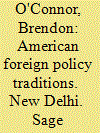

|
|
|
|
|
| Publication |
New Delhi, Sage Publication, 2010.
|
| Description |
4 Vol. Set.; p.
|
| Series |
Sage library of international relations
|
| Contents |
Vol. 1: The foundations of the American tradition
Vol. 2: The traditions of great power
Vol. 3: Anti-American tradition
Vol. 4: Regional and national varieties of anti-Americanism
|
| Standard Number |
9781847872715, hbk
|
|
|
|
|
|
|
|
|
|
|
|
Copies: C:4/I:0,R:0,Q:0
Circulation
| Accession# | Call# | Current Location | Status | Policy | Location |
| 055564 | 327.73/OCO 055564 | Main | On Shelf | General | |
| 055565 | 327.73/OCO 055565 | Main | On Shelf | General | |
| 055566 | 327.73/OCO 055566 | Main | On Shelf | General | |
| 055567 | 327.73/OCO 055567 | Main | On Shelf | General | |
|
|
|
|
| 2 |
ID:
039475
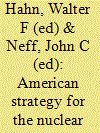

|
|
|
|
|
| Publication |
New York, Anchor Books Doubleday of Company, 1960.
|
| Description |
xxi, 455p.
|
|
|
|
|
|
|
|
|
|
|
|
Copies: C:1/I:0,R:0,Q:0
Circulation
| Accession# | Call# | Current Location | Status | Policy | Location |
| 012309 | 355.033573/HAN 012309 | Main | On Shelf | General | |
|
|
|
|
| 3 |
ID:
079570
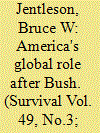

|
|
|
| 4 |
ID:
105713
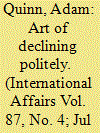

|
|
|
|
|
| Publication |
2011.
|
| Summary/Abstract |
Predictions of 'American decline' have come and gone before, apparently in cycles, leading some to regard it as a cultural trope stemming from domestic insecurities rather than a serious prospect. There is reason to believe, however, that this time is different. Fundamental erosion of the United States' decades-long primacy may finally be at hand, and wise analysis should resist the temptations of contrarianism or denial. Critics of 'declinism' have offered important caveats with which we should qualify any overly simplistic or deterministic portrait of America's trajectory from hegemon to lesser status. This article gives such qualifications due weight while nevertheless seeking to steer our gaze back towards the core truth at the heart of the declinist thesis. That is: unless something very significant changes to jolt the course of events onto a different track, the relative power of the United States-measured in terms of its advantage over others in economic and military capacity-will be shrinking significantly over the decades to come. Happily, the nation's current president seems to have a disposition well fitted to leading the nation into the opening stages of an era of relative decline. President Obama has made headlines in recent months for his boldness in orchestrating the killing of Osama bin Laden. A fuller survey of his foreign policy, however, reveals that its most signal feature has been prudence and circumspection regarding American power and its exercise. Major divergence between the ends pursued and the capacities available for their pursuit is one of the cardinal sins giving rise to strategic failure. It is thus fortunate for the United States that it should have a president who, even if he may not be inclined to cast it in such words himself, seems disposed not to 'rage against the dying of the light' of American primacy, but to practice the admirable art of declining politely.
|
|
|
|
|
|
|
|
|
|
|
|
|
|
|
|
| 5 |
ID:
026316
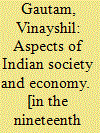

|
|
|
|
|
| Edition |
1st ed.
|
| Publication |
DelhI, Motilal Banarsidass, 1972.
|
| Description |
v, 201p.hbk
|
|
|
|
|
|
|
|
|
|
|
|
Copies: C:1/I:0,R:0,Q:0
Circulation
| Accession# | Call# | Current Location | Status | Policy | Location |
| 010001 | 954.94/GAU 010001 | Main | On Shelf | General | |
|
|
|
|
| 6 |
ID:
076533
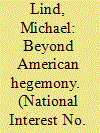

|
|
|
| 7 |
ID:
085687
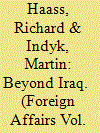

|
|
|
|
|
| Summary/Abstract |
To be successful in the Middle East, the Obama administration will need to move beyond Iraq, find ways to deal constructively with Iran, and forge a final-status Israeli-Palestinian agreement.
|
|
|
|
|
|
|
|
|
|
|
|
|
|
|
|
| 8 |
ID:
093920
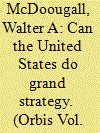

|
|
|
|
|
| Publication |
2010.
|
| Summary/Abstract |
Two big issues that scholars and strategists need to address are simply: does grand strategy have to be articulated for it to be said to exist at all; and if not, can grand strategy be said to move a nation even when that nation's fluctuating roster of (often competent) leaders are unsure as to why they do anything? My task here is that of a rapporteur and provocateur raising issues on which we may need to reach some consensus.
|
|
|
|
|
|
|
|
|
|
|
|
|
|
|
|
| 9 |
ID:
106594
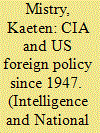

|
|
|
| 10 |
ID:
028344
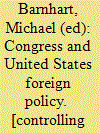

|
|
|
|
|
| Publication |
New York, State University of New York, 1987.
|
| Description |
xi, 196p.
|
| Standard Number |
0887064663
|
|
|
|
|
|
|
|
|
|
|
|
Copies: C:1/I:0,R:0,Q:0
Circulation
| Accession# | Call# | Current Location | Status | Policy | Location |
| 028261 | 342.73412/BAR 028261 | Main | On Shelf | General | |
|
|
|
|
| 11 |
ID:
050011
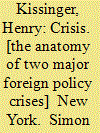

|
|
|
|
|
| Publication |
New York, Simon and Schuster, 2003.
|
| Description |
564p.
|
| Standard Number |
0743249100
|
|
|
|
|
|
|
|
|
|
|
|
Copies: C:1/I:0,R:0,Q:0
Circulation
| Accession# | Call# | Current Location | Status | Policy | Location |
| 047419 | 327.2/KIS 047419 | Main | On Shelf | General | |
|
|
|
|
| 12 |
ID:
080305
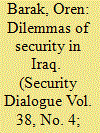

|
|
|
|
|
| Publication |
2007.
|
| Summary/Abstract |
This article suggests that much of the violence that has ravaged Iraq since the country's occupation by the US-led coalition in 2003 can be explained by focusing on the interplay between domestic and external factors that pushed Iraq's major communities (Shi'is, Sunnis, and Kurds) into conflict. The domestic factors include an intercommunal `security dilemma' that was engendered by the US-led invasion; the role of belligerent `ethnic entrepreneurs' within these communities; and the long-term animosities, apprehensions, and fears among their members. External factors include the disbandment of Iraq's ruling elite, regime, and security sector by the USA, along with the role of the Arab and Muslim volunteers who came to fight Iraq's foreign occupation. The article concludes by discussing the possible ramifications of the conflict in Iraq for domestic, regional, and international security, and mentions several steps that can help ameliorate it.
|
|
|
|
|
|
|
|
|
|
|
|
|
|
|
|
| 13 |
ID:
089279
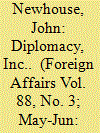

|
|
|
|
|
| Publication |
2009.
|
| Summary/Abstract |
The area around K Street in Washington, D.C., abounds with lobbyists, many of whom represent foreign governments or entities. Although some major foreign governments continue to work mainly through their embassies in Washington, nearly one hundred countries rely on lobbyists to protect and promote their interests. The subculture of public relations and law firms that do this kind of work reflects a steady decline and privatization of diplomacy -- with an increasing impact on how the United States conducts its own foreign policy.
|
|
|
|
|
|
|
|
|
|
|
|
|
|
|
|
| 14 |
ID:
076863
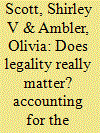

|
|
|
|
|
| Publication |
2007.
|
| Summary/Abstract |
The perceived legitimacy of US foreign policy plummeted in the wake of the US-led 2003 invasion of Iraq. Most commentators would agree that international law, or at least US actions in relation to international law, had something to do with this decline. But, what the recent debate as to how best to restore US legitimacy has starkly revealed, is that we know little as to just how international law accords legitimacy to certain foreign policy endeavours. While the legality of the action may have much to do with it, the relationship between international law, foreign policy and legitimacy appears to be more complex than is suggested by a straightforward legal-illegal categorization of behaviour. A theorization of international law as ideology can provide an overall explanation of the role of international law in the decline in US foreign policy legitimacy following the invasion of Iraq
|
|
|
|
|
|
|
|
|
|
|
|
|
|
|
|
| 15 |
ID:
039277
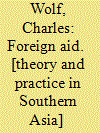

|
|
|
|
|
| Publication |
Pinceton, Princeton University Press, 1960.
|
| Description |
ix, 442p
|
|
|
|
|
|
|
|
|
|
|
|
Copies: C:1/I:0,R:0,Q:0
Circulation
| Accession# | Call# | Current Location | Status | Policy | Location |
| 012359 | 338.9173054/WOL 012359 | Main | On Shelf | General | |
|
|
|
|
| 16 |
ID:
114523
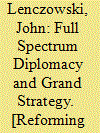

|
|
|
|
|
| Publication |
Lanham, Lexington Books, 2011.
|
| Description |
xv, 213p.Hbk
|
| Standard Number |
9780739150658
|
|
|
|
|
|
|
|
|
|
|
|
Copies: C:1/I:0,R:0,Q:0
Circulation
| Accession# | Call# | Current Location | Status | Policy | Location |
| 056790 | 327.73/LEN 056790 | Main | On Shelf | General | |
|
|
|
|
| 17 |
ID:
105711
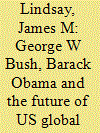

|
|
|
|
|
| Publication |
2011.
|
| Summary/Abstract |
The foreign policy world views of George W. Bush and Barack Obama differ dramatically. Bush made terrorism the focal point of his foreign policy and dismissed the idea that either allies or international institutions should constrain America's freedom of action. Obama sees terrorism as one of many transnational problems that require the cooperation of other countries to combat and, as a result, the United States must invest more in diplomatic efforts to build partnerships. Despite these differences, both presidents share one common conviction: that other countries long for US leadership. Bush believed that friends and allies would eventually rally to the side of the United States, even if they bristled at its actions, because they shared America's goals and had faith in its motives. Obama believed that a United States that listened more to others, stressed common interests and favored multinational action would command followers. In practice, however, both visions of American global leadership faltered. Bush discovered that many countries rejected his style of leadership as well as his strategies. Obama discovered that in a globalized world, where power has been more widely dispersed, many countries are not looking to Washington for direction. The future success of US foreign policy depends on the ability of policy-makers to recognize and adapt to a changing geopolitical environment in which the US remains the most significant military, diplomatic and economic power but finds it, nonetheless, increasingly difficult to drive the global agenda.
|
|
|
|
|
|
|
|
|
|
|
|
|
|
|
|
| 18 |
ID:
077697
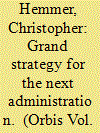

|
|
|
| 19 |
ID:
030000


|
|
|
|
|
| Publication |
London, Prentice-Hall Inc., 1970.
|
| Description |
246p.
|
| Standard Number |
133688618
|
|
|
|
|
|
|
|
|
|
|
|
Copies: C:1/I:0,R:0,Q:0
Circulation
| Accession# | Call# | Current Location | Status | Policy | Location |
| 004026 | 355.0218/BEA 004026 | Main | On Shelf | General | |
|
|
|
|
| 20 |
ID:
047678
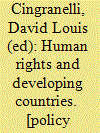

|
|
|
|
|
| Publication |
Greenwitch, JAI Press, 1996.
|
| Description |
viii, 242p.
|
| Series |
Policy studies and developing nations; vol.4
|
| Contents |
Vol. 4
|
| Standard Number |
0762300361
|
|
|
|
|
|
|
|
|
|
|
|
Copies: C:1/I:0,R:0,Q:0
Circulation
| Accession# | Call# | Current Location | Status | Policy | Location |
| 042659 | 323.091724/CIN 042659 | Main | On Shelf | General | |
|
|
|
|
|
|
|
|
|